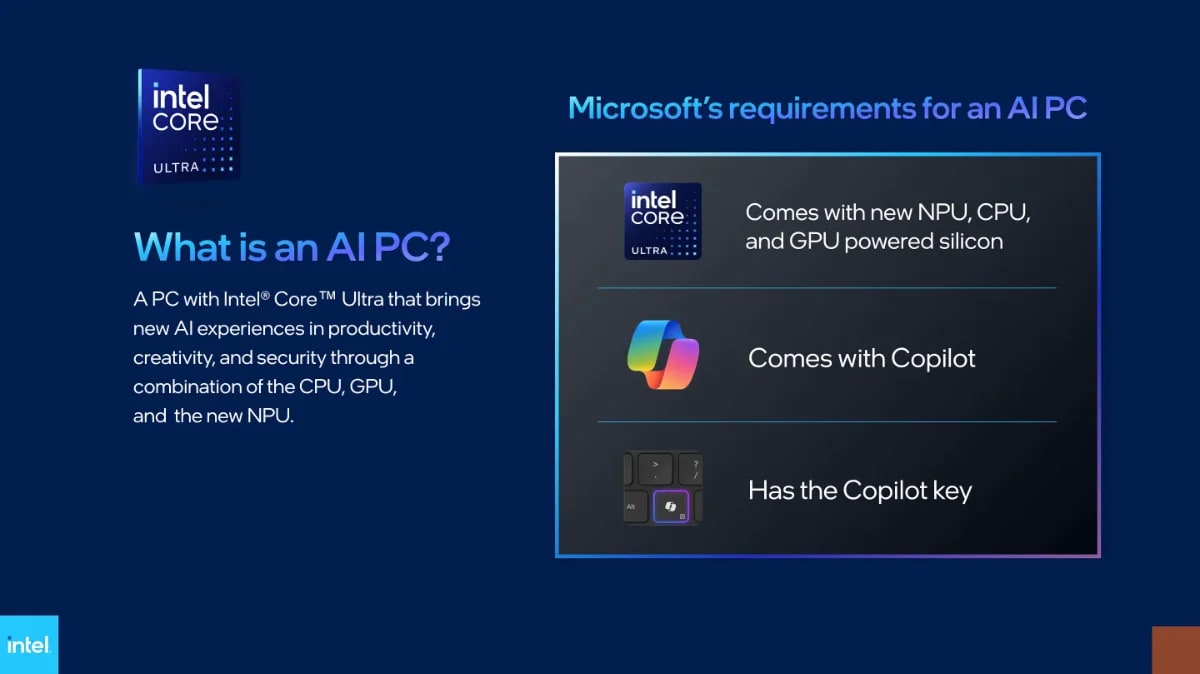Microsoft hopes 2024 will be the year the so-called AI PCs will take off. Information and rumors about this new generation of PCs are found everywhere, but Microsoft itself has remained tight-lipped when it comes to the requirements.
Intel has now published Microsoft’s requirements for an AI PC. It was clear from the start that AI PCs required a Neural Processing Unit (NPU) and modern CPU and GPU silicon. Intel says that for a PC to be called an AI PC, it must meet two additional requirements: it needs Copilot as well as the Copilot key.

While it was clear that Copilot plays a role in AI PCs, as it forms the core of Microsoft’s artificial intelligence strategy, it may come as a surprise that the dedicated co-pilot key on the keyboard is also a requirement.
Microsoft announced the Copilot key in early 2024. It is a dedicated key on the keyboard that activates the Copilot functionality when used. The full functionality of the key is unknown at this point, but it seems likely that it will bring Copilot’s interface to the forefront once activated. The introduction of the key marks the first major change to Windows keyboards in almost 30 years. The last addition was the Windows key.
At the time, Microsoft said the Copilot key was optional. Manufacturers could select a position on the keyboard or ignore it altogether. It now appears that AI PCs require at least this key, at least according to Intel.
These requirements mean that some laptops and PCs cannot be called AI PCs even if they are equipped with a dedicated NPU and Intel’s latest Core Ultra silicon. An example of such a laptop is The new ROG Zephyrus from ASUSwhich has a dedicated NPU but no Copilot key on the keyboard.
It’s unclear at this point whether non-AI PCs will be at a disadvantage when Microsoft releases the next version of Windows 11. The plan is to turn regular Windows 11 systems into AI PCs. It remains to be seen to what extent this is marketing. Manufacturers may not promote their products as AI PCs if they do not meet any of the requirements. In terms of features, it is possible that Windows will provide full AI functionality if the PC has an NPU and modern silicon.
The NPU requirement could hint at local processing. Currently, all interactions with Copilot require an Internet connection. User data, for example the text you enter, is submitted to Microsoft servers. It is processed there and then returned. This is expensive and also bad for performance, as it may take a few seconds for responses to appear on the user’s screen. Local transformation could finally make Useful Windows-specific Copilot optionsbecause this would speed them up considerably.
Most manufacturers will likely end up jumping on the PC AI bandwagon. This means that most PCs that come out will have the dedicated Copilot key on the keyboard.
Microsoft pushed a dedicated Copilot application recently on Windows devices. The purpose of the app is unclear, as it is a fictitious app at the moment.
Now you: have you tried Copilot? What do you think ? (via The edge)
Summary

Article name
Intel: Microsoft AI PCs need a co-pilot key
Description
Intel has released Microsoft’s requirements for AI PCs and one of the requirements is that PCs and laptops require a dedicated Copilot key on the keyboard.
Author
Martin Brinkmann
Editor
Ghacks Technology News
Logo

Advertisement


